|
|
|
Sort Order |
|
|
|
Items / Page
|
|
|
|
|
|
|
| Srl | Item |
| 1 |
ID:
113890


|
|
|
|
|
| Publication |
2011.
|
| Summary/Abstract |
This article analyzes popular narratives surrounding the theme of drug lords in the Mexican border city of Juarez and their multifaceted social, ideological, and material effects. This analysis takes into consideration the historical context of eruptions of violence that Juarez has endured in the last few years. Complex formations of the Mexican identity are now being reformulated in hierarchical, gendered, and racialized identities, which project the very strong and powerful social frictions currently emerging from complex socioeconomic factors resulting in mass poverty and migration. These elements are evinced in the narco-narratives within their violent contexts. However, violence in Juarez must not be interpreted as upsurges outside the control of the state, but rather as byproducts of conflict within it (see Das and Poole 2004). Thus, on the border, Juarez becomes a central site, not a periphery, in which economic and political forces materialize in the middle of complex social dynamics.
|
|
|
|
|
|
|
|
|
|
|
|
|
|
|
|
| 2 |
ID:
161721
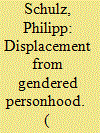

|
|
|
|
|
| Summary/Abstract |
This article empirically deconstructs the gendered effects of sexual violence on male survivors' masculinities in northern Uganda. Throughout the growing literature on the topic, the effects of wartime gender-based violence against men are widely seen as compromising male survivors' masculine identities, commonly framed as ‘emasculation’ by way of ‘feminization’ and/or ‘homo-sexualization’. Yet exactly how such processes unfold from survivors' perspectives remains insufficiently explored, nor has existing scholarship critically engaged with the dominant analytical categories and their associated terminologies. This article seeks to engage with both of these gaps. First, I identify normative and analytical shortcomings of the ‘emasculation’/‘feminization’ paradigm. Drawing on Edström, Dolan and colleagues, I propose an alternative reading to analyse the effects of sexual violence on gender identities. Second, I argue that the impact of sexual violence on masculinities is a layered process, compounded through numerous sexual and gendered harms and perpetuated over time. In northern Uganda, this process is composed of intersecting gendered harms that subordinate male survivors along gendered hierarchies, and that signify survivors' perceived inabilities to provide, protect and procreate—as expected of them by local constructions of hegemonic masculinity. I therefore emphasize that sexual violence against men strikes at multiple levels of what it means to be a man, which is important to understanding and addressing these layered gendered harms in the aftermath of the violations.
|
|
|
|
|
|
|
|
|
|
|
|
|
|
|
|
| 3 |
ID:
163852
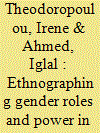

|
|
|
|
|
| Summary/Abstract |
This ethnographic study examines how gender roles associated with male and female Qatari students in intercultural communication courses in a university in Qatar are negotiated between them and their two female instructors from the US and Greece. Our aim is to contribute towards the development of good practice related to the teaching of information exchange among group members who are not culturally alike,1 by arguing that an efficient way of overcoming misunderstandings between instructors and students is to engage in a pedagogical approach, which we call “dialogical infotainment”. This serves the ultimate goal of sharing various types of power in order to sharpen our cultural sensitivity and subsequent tolerance and respect for each other’s gender role-related peculiarities.
|
|
|
|
|
|
|
|
|
|
|
|
|
|
|
|
| 4 |
ID:
158663
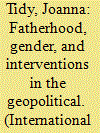

|
|
|
|
|
| Summary/Abstract |
War and peace are gendered and gendering geopolitical processes, constituting particular configurations of masculinity and femininity. When men are considered in relation to war and peace the majority of scholarly accounts focus on soldiers and perpetrators, typically observing their place in the gendered geopolitical solely through military/ized masculinities. In contrast, this article examines fatherhood as a masculine subjectivity, interacting in a nexus with other masculinities to produce an intelligible propeace intervention in war, and considers the implications for our understandings of gender and the geopolitical. To analyze this political subjectivity of what I term “paternal peace,” the article considers the case of Bob Bergdahl. Bergdahl’s son was a US soldier held by a Taliban-aligned group for five years until 2014. During this time Bergdahl was publically critical of US foreign policy, presenting his son’s release as part of a peace process that could end violence in Afghanistan. I unpack how Bergdahl’s public political subjectivity was the outcome of a “gender project” drawing on accounts of “valley” fatherhood in combination with particular forms of diplomatic and military masculinity. I consider how Bergdahl’s intervention was publically received, and how the geopolitical reach of it was pacified within gendered and racialized coding.
|
|
|
|
|
|
|
|
|
|
|
|
|
|
|
|
| 5 |
ID:
156656
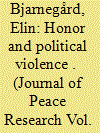

|
|
|
|
|
| Summary/Abstract |
Who participates in political violence? In this study, we investigate the issue at the micro-level, comparing individuals who have used violence in political uprisings with those who have not. We develop our argument from the observation that men are strongly overrepresented in political violence, although most men do not participate. Literature on masculinities emphasizes the role of honor and its links to different forms of violence, such as domestic abuse, criminal violence, and violent attitudes. Building on this literature, we discern two separate but related aspects of honor: honor as male societal privilege and control over female sexuality, that is, patriarchal values, and honor as ideals of masculine toughness, that is, the perceived necessity for men to be fierce and respond to affronts with violence or threats of violence in order to preserve status. We argue that patriarchal values combined with ideals of masculine toughness together constitute honor ideology, which contributes in turn to the explanation of who participates in political violence. We present new and unique individual-level survey data on these issues, collected in Thailand. We find that honor ideology strongly and robustly predicts a higher likelihood of participating in political violence among male political activists. A number of previous studies found a macro-level relationship between gender equality and peacefulness in a society. This study provides evidence for one micro-level mechanism linking gender equality and political violence at the macro level. Based on these results, we conclude that honor ideology endorsement is a driver of violence in political conflicts.
|
|
|
|
|
|
|
|
|
|
|
|
|
|
|
|
| 6 |
ID:
174505
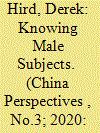

|
|
|
|
|
| Summary/Abstract |
This article probes the sources, manifestations, and significances of the ambivalences and contradictions in London-based Chinese middle-class male professionals’ sense of their own gendered and cultural identities in the context of China’s twenty-first century postsocialist modernity. In doing so, it shows how Chinese middle-class men’s sense of themselves connects with wider national debates about China’s orientation in the world. To make sense of the desire of some respondents “to become a Chinese gentleman,” the article introduces the notion of the postsocialist Confucian sublime, a vision of a cultural order of increasing appeal to well-educated, middle-class Chinese men. The article argues that the Confucian sublime offers globally mobile professional Chinese men the opportunity to transcend their ambivalence towards Western modernity by providing a sense of wholeness and attainment both at a personal level and in relating to China’s place in contemporary globality.
|
|
|
|
|
|
|
|
|
|
|
|
|
|
|
|
| 7 |
ID:
146537


|
|
|
|
|
| Summary/Abstract |
This study investigates constructions of manliness in the late-colonial Netherlands Indies (1870s–1930s), with particular reference to the so-called ‘Sino-Malay’ novels and newspapers produced by its local-born, culturally hybrid Chinese population (Peranakan). These authors incorporated ideas from South East Asia as well as China and Europe in their works, providing insights in traditional notions of heteronormative manhood, but also exposing major reconfigurations of gender within the diverse conditions of modernity. Their writings thus provide an underexplored vista into a remarkably diverse society in transition. I will centre on words used in the Malay vernacular to characterize men and male behaviour. This serves as a springboard to explore three interconnected themes surrounding manliness in Sino-Malay publications: violence, sexuality, and modernity. As will be shown, several constructions of gender and manifestations of popular culture associated with modern Indonesia were rooted in the same discourse as these colonial-era works.
|
|
|
|
|
|
|
|
|
|
|
|
|
|
|
|
| 8 |
ID:
134147


|
|
|
|
|
| Publication |
2014.
|
| Summary/Abstract |
This article contributes to the existing critical theory and gender scholarship on private military security companies by examining how the gendered subjectivities of third-country nationals (TCNs) are constituted through the intersections of colonial histories and neoliberal economic practices. Focusing on Gurkha contractors, I ask how it is that both the remuneration and the working conditions of TCNs are inferior to those of their white Western peers within the industry. The article shows that Gurkhas' working conditions flow from their location on the periphery of global employment markets, a disadvantage that is further inflected by their status as racially underdeveloped subjects. Thus, their material and cultural status within the industry - regardless of the abilities of the individuals in question - is argued to be the outcome of tenacious colonial histories that continue to shape the labour-market opportunities of men from the global South within larger global security governance practices that increasingly feature outsourcing of military labour in operations.
|
|
|
|
|
|
|
|
|
|
|
|
|
|
|
|
| 9 |
ID:
169042
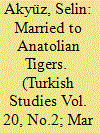

|
|
|
|
|
| Summary/Abstract |
This paper examines business masculinities and relationalities of empowerment in the everyday life experiences of male entrepreneurs and wives of entrepreneurs in three urban centers in Turkey: Gaziantep, Konya and İzmir. We take gendered power inequalities as structural and relational, and empowerment as a complex, multifaceted process. Based on a relational understanding of gender roles, we scrutinize men’s and women’s decision making areas in an attempt to understand normalized and internalized patriarchal values and assumptions, as well as explicit or implicit challenges against such values. We argue that gendered experiences of entrepreneurs and women married to entrepreneurs offer a complementary analysis of nuanced empowerment strategies in the background of seemingly contradictory currents such as economic globalization, transforming masculinities, rising conservatism and reinforced gender hierarchies.
|
|
|
|
|
|
|
|
|
|
|
|
|
|
|
|
| 10 |
ID:
144228
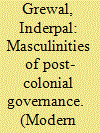

|
|
|
|
|
| Summary/Abstract |
This article examines the memoirs of Indian Civil Service officers as they continued to work in what became the Indian Administrative Service after independence. Rather than being understood solely as historical archives, these texts constitute a genre that can be called the ‘bureaucratic memoir’ which reveals masculinities that are both colonial and post-colonial. These memoirs, and their publication decades after independence reveal attempts by elites to preserve the power of the bureaucracy into subsequent decades. The texts hope to disavow but instead also reveal the patriarchal intimacies of these elites, even as these were challenged by charges of corruption and failure which emerged almost from the first moments of independence.
|
|
|
|
|
|
|
|
|
|
|
|
|
|
|
|
| 11 |
ID:
089255


|
|
|
|
|
| Publication |
2009.
|
| Summary/Abstract |
A nation-state has a responsibility to protect its women as equal citizens, yet states like Pakistan have structurally disenfranchised women from state protection by making them half citizens and reducing their right to be their own legal person. As a consequence, women have been excluded from discourses on internal and external security. In any armed conflict, women are the ones who suffer the most, yet they are embodied as symbols of honour for the state and society. Through security debates, the roles and boundaries of 'male' and 'female' are so defined that they perpetuate violence through sharp divisions between the 'public' and the 'private' sphere. The protector's (state/men of the family) fear of failure results in restrictions being imposed on the protected (women), including those on their participation in policy debates. Acts of violence on the weak and the vulnerable are justified through moral arguments.
|
|
|
|
|
|
|
|
|
|
|
|
|
|
|
|
| 12 |
ID:
185889
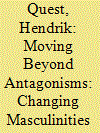

|
|
|
|
|
| Summary/Abstract |
In this paper, I theorize and empirically illustrate how security sector reforms (SSR) can transform violence-centred masculinities in post-conflict militaries. I argue that substantial change of such gender roles depends on challenging the power that is institutionally inscribed into the constructed antagonisms between (1) men and women, (2) fighters and civilians, and (3) perpetrators and victims of violence. A case study on changing masculinities within the Armed Forces of Liberia (AFL) via SSR illustrates this argument. During the violent conflict in Liberia between 1989 and 2003, the AFL infamously perpetrated large-scale violence against civilians, enacting particularly violent forms of masculinity. After the war, the AFL was dissolved and rebuilt with an emphasis on human rights and, partly, gender mainstreaming. Drawing from interviews with multiple stakeholders and practice-theoretical reasoning, the paper renders empirically and theoretically tangible that SSR can change institutional constructions of masculinity by challenging socially constructed antagonisms that give power to men, fighters, and perpetrators.
|
|
|
|
|
|
|
|
|
|
|
|
|
|
|
|
| 13 |
ID:
119998
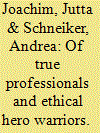

|
|
|
|
|
| Publication |
2012.
|
| Summary/Abstract |
Private military and security companies (PMSCs) have gained increasingly in importance over the course of the past two decades. Yet, given the intransparency of the industry and the heterogeneity of the companies that comprise it, we thus far know little about the actors involved. In this article, we offer preliminary insights into the self-representation of PMSCs, based on a gender-discourse analysis of the homepages of select companies and their main professional associations. We argue that survival in an increasingly competitive industry not only hinges on size, market share or effectiveness, but is also inherently gendered. PMSCs and their associations draw on the one hand on civilized and accepted forms of masculinity and femininity, presenting themselves as 'highly skilled professional' military strategists and ordinary businesses akin to banks or insurance companies. At the same time, however, PMSCs also engage in strategies of (hyper)masculinization and pathologization to set themselves apart from mercenaries, their private competitors and state security forces. In this respect, companies appear to view themselves as 'ethical hero warriors'. Whether intended or not, their strategies have political consequences. Within the security industry, they contribute to the creation and maintenance of a norm regarding what constitutes a legitimate PMSC, to which more or less all companies strive to adhere. Vis-à-vis other security actors, these strategies seek to establish PMSCs as being superior because, unlike these actors, such companies are super-masculine and able to live up to the growing and sometimes contradictory demands of changing security contexts.
|
|
|
|
|
|
|
|
|
|
|
|
|
|
|
|
| 14 |
ID:
158264
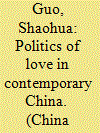

|
|
|
|
|
| Summary/Abstract |
Since the new millennium, the television industry in China has witnessed a flourishing of television series addressing the aspirations, struggles and gender expectations of the urban middle class. Nevertheless, with few exceptions, little scholarly attention has been devoted to the televisual construction of masculine ideals in the contemporary era. Taking as a case study Best Time (最美的时光), one of the most popular idol dramas of 2013, this article fills a lacuna in current scholarship and addresses the televisual construction of cosmopolitan masculinities by focusing on the tension between two prominent social groups: overseas returnees and indigenous talents. Through analysis of the construction of competing masculinities in Best Time, this article argues that this drama is as much about an undertone of national rejuvenation, and the desire for China’s rise and global dominance, as it is about unrequited love. In pursuing this argument, a critical reading of a youth idol drama opens new avenues for understanding cosmopolitanism through the lenses of gender dynamics and nationalism.
|
|
|
|
|
|
|
|
|
|
|
|
|
|
|
|
| 15 |
ID:
102880
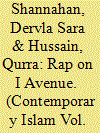

|
|
|
| 16 |
ID:
102934


|
|
|
|
|
| Publication |
2011.
|
| Summary/Abstract |
This paper presents research findings from fieldwork in the rap scene of Tunis. Although the scene is relatively small, especially when compared to its Algerian counterpart, the number of young men involved in rap is expanding rapidly, particularly with the internet as a networking and promoting tool. Throughout the discussion I explore some of the ways that (Sunni) Islam intersects with rap in the artists' lives, lyrics and identities, and the ways that their particular locatedness informs their position within what has been termed the 'transglobal hip hop nation'. Whilst interpreting religion has long been a contested area in Tunisia, it seems that rap here functions as a route to articulating alternative interpretations of Islam, ones which not only unite the artists but offer potential for pan-umma and transglobal connectivities. These potentialities resonate with the idea of a 'transglobal hip hop ummah' and provide the artists with arenas for personal, political, collective and spiritual expression.
|
|
|
|
|
|
|
|
|
|
|
|
|
|
|
|
| 17 |
ID:
088849
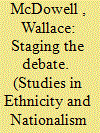

|
|
|
|
|
| Publication |
2009.
|
| Summary/Abstract |
This paper, which emanates from the field of theatre studies, examines plays written by Belfast writer Gary Mitchell in and around the time of the Good Friday (Belfast) Agreement of 1998. Mitchell occupies a unique position in Irish theatre, being the first playwright to emerge from and offer a dramatic critique of paramilitary-dominated Loyalist communities. Central to the paper is the argument that Mitchell offers a set of important insights into how such communities reflect academic debates around masculinities, imagined national communities and the relationship between masculinity and violence. The paper looks at three plays which received premieres around the time of the Belfast agreement and utilises the theoretical approaches offered by proponents of hegemonic masculinity as well as post-Foucauldian thinkers
|
|
|
|
|
|
|
|
|
|
|
|
|
|
|
|
| 18 |
ID:
173757


|
|
|
|
|
| Summary/Abstract |
This article explores models of identity at the U.S. Air Force Academy. Drawing on qualitative data gathered through a number of focus groups with cadets, it finds that despite technological changes that have revolutionized the battle space and policy efforts to shift the cultural identity of the forces, ideal identities remain infused with concepts that value the classical model of the heroic masculine. It suggests that functionally, this highly prized “warrior” ethos is becoming less relevant but could have the effect of undermining efforts to “diversify” the Academy. In the absence of a fundamental reconsideration of what constitutes the “ideal” air force officer, efforts to alter the demography and exclusionary culture at the Academy will be stymied.
|
|
|
|
|
|
|
|
|
|
|
|
|
|
|
|
| 19 |
ID:
173194
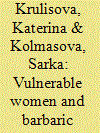

|
|
|
|
|
| Summary/Abstract |
Examining the case of Mali, this work analyses the discursive strategies utilised by key actors to legitimise the UN’s Multidimensional Integrated Stabilisation Mission in Mali (MINUSMA). The analysis traces the legitimisation strategies deployed in both the official and unofficial discourses surrounding the operation. Using van Leeuwen’s conceptualisation of legitimisation, this work uncovers the subtle and not-so-subtle ways the dominant discourse foregrounds certain gendered harms. We argue that the primarily Western conceptualisation of the situation in Mali foregrounds the rape (of young girls) to form the strongest pro-intervention argument. Within this logic, the focus on the bodies of violated women and children aims at providing the undeniable and ultimate proof of barbarity of local rebels. This leads to an immediate need for deployment and continuation of a robust peacekeeping mission.
|
|
|
|
|
|
|
|
|
|
|
|
|
|
|
|
| 20 |
ID:
124513
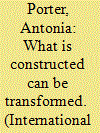

|
|
|
|
|
| Publication |
2013.
|
| Summary/Abstract |
This article explores masculinities in post-conflict contexts in Africa and the need for their transformation. It commences with an examination of the constructs of masculinity and masculinities, and presents perspectives on masculinities in Africa, including possible sources of gender conditioning on the continent. The article then reviews the main roles that men play and the various conditions that confront them during and after violent conflicts in Africa, and examines particular features and challenges that men and their masculinities face in African post-conflict societies. Lastly, the article reviews some practical interventions that aim to transform masculinities in various contexts, and suggests possible avenues towards more effective and sustainable transformation.
|
|
|
|
|
|
|
|
|
|
|
|
|
|
|
|
|
|
|
|
|